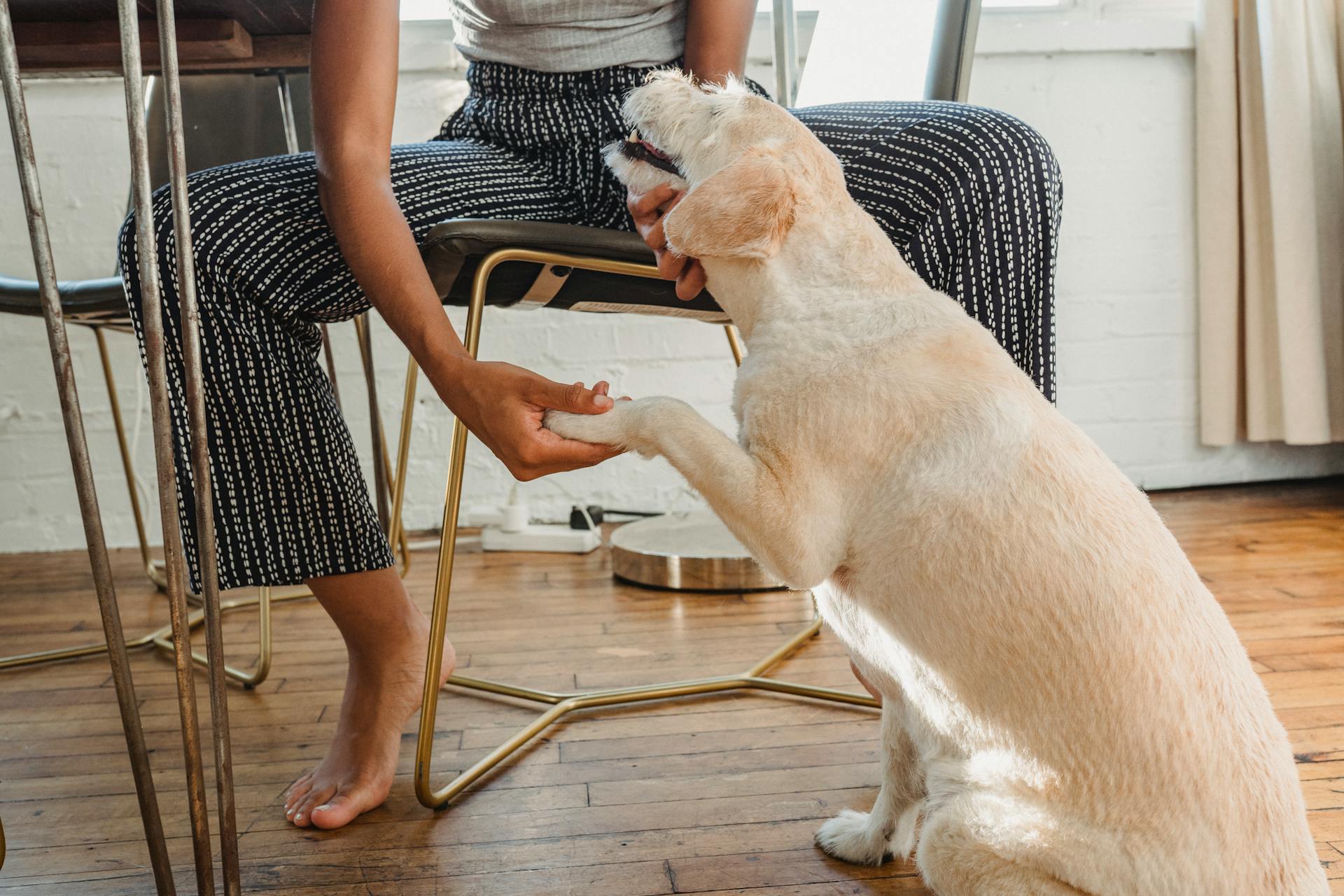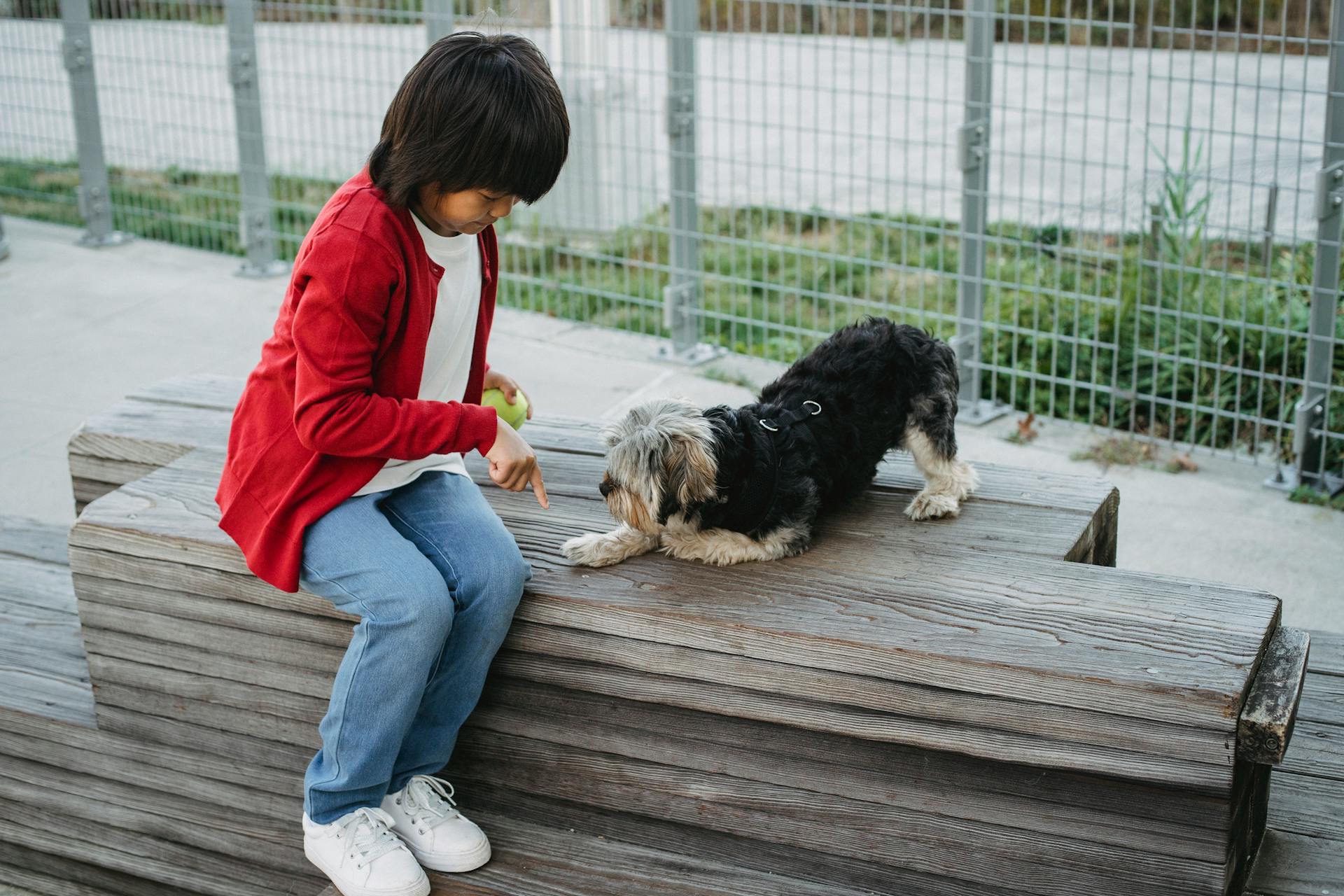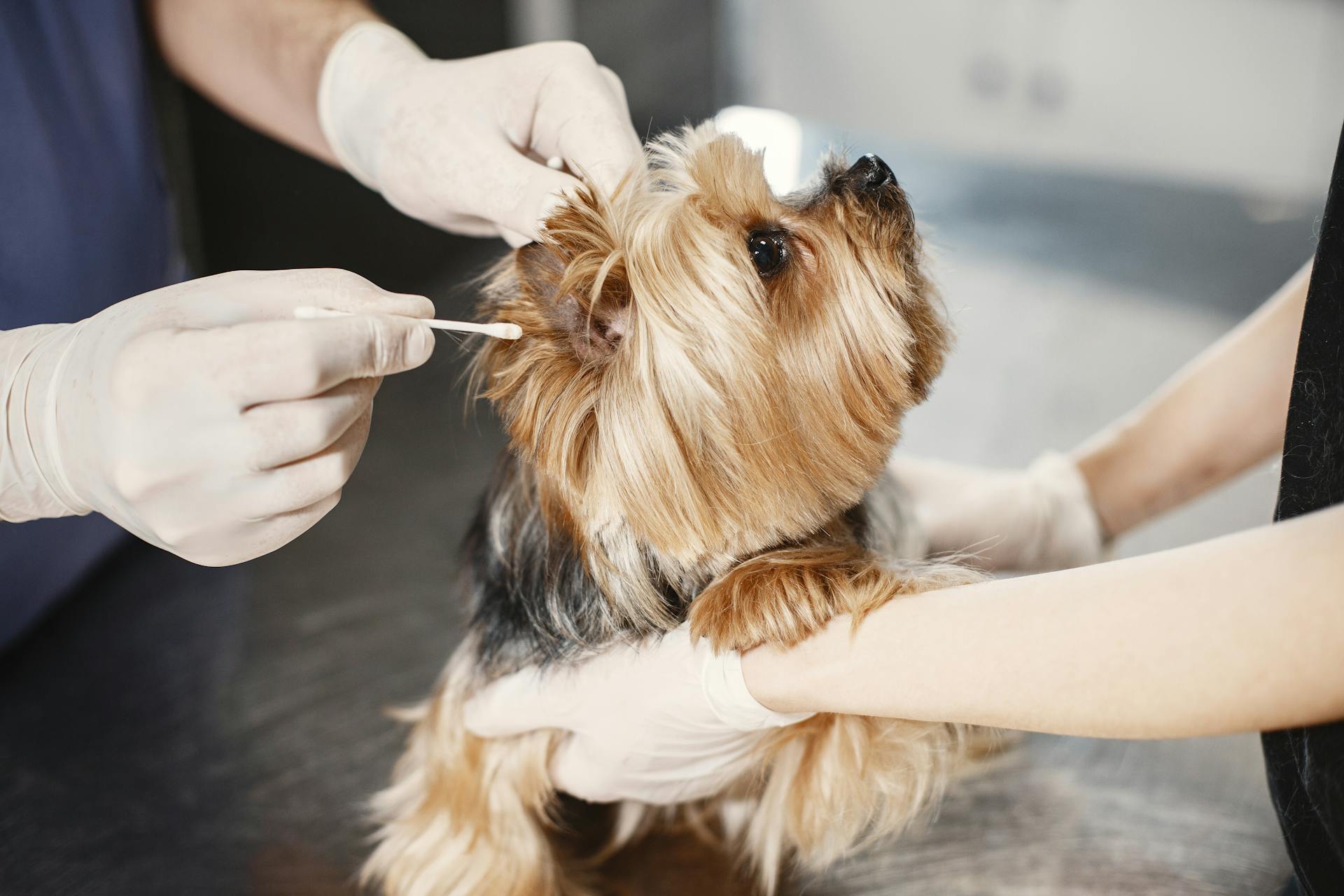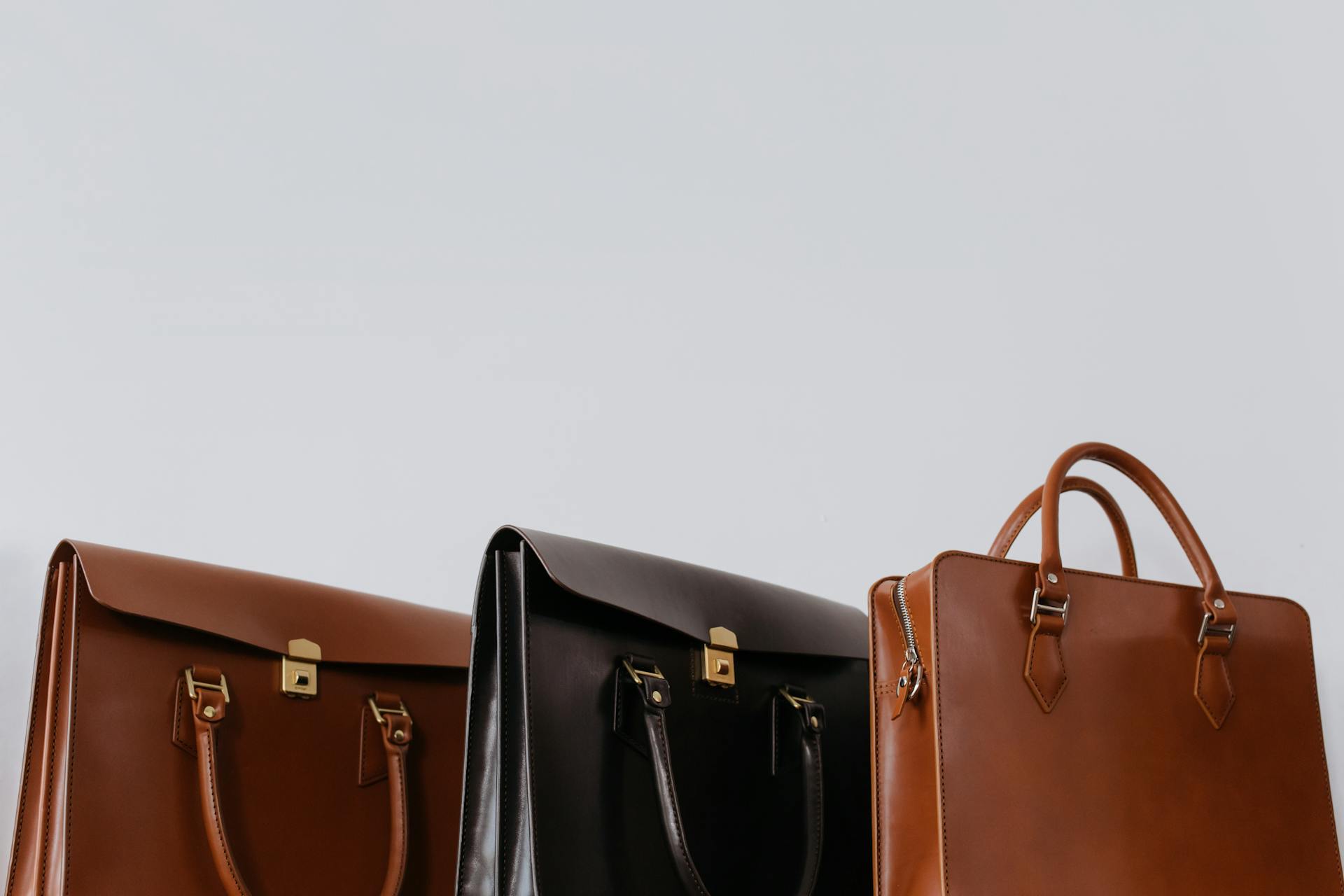
It's not uncommon for female dogs to pee on the couch, but it's still frustrating and can be a sign of an underlying issue. One possible reason is that your dog is not being let outside frequently enough, causing her to hold her urine for too long.
If you're not taking your dog out regularly, she may associate the couch with a safe place to pee, especially if she's not getting enough attention or exercise. This behavior is often linked to medical issues, such as urinary tract infections or kidney stones, so it's essential to rule out any health problems.
Some female dogs may also pee on the couch due to anxiety or stress, which can be triggered by changes in your work schedule, moving to a new home, or even the presence of other pets. If you suspect this is the case, try to identify the source of your dog's anxiety and address it accordingly.
Dogs often learn by association, so if your dog has peed on the couch before and hasn't been punished or corrected, she may think it's an acceptable behavior.
If this caught your attention, see: Why Is My Female Dog Whining so Much
Dogs House Soiling: Possible Medical Causes
Dogs can develop medical conditions that cause them to pee in the house, even if they're fully house trained. Medical conditions can affect a dog's urinary or digestive health, leading to an urgency to eliminate.
Some common medical conditions that can cause house soiling include urinary tract infections, ectopic ureters, uroliths, Cushing's Disease, kidney disease, and spinal cord diseases. These conditions can cause dogs to involuntarily lose control of their bladder.
A dog's mental health can also play a role in their indoor accidents. If a dog is experiencing separation anxiety, it can lead to indoor peeing. Dogs in heat may also experience bladder issues.
Other possible medical causes of house soiling include bladder infections, bladder stones, intestinal parasites, diabetes, kidney or liver problems, tumors, old age, and age-related conditions. These conditions can cause a dog to involuntarily pee in the house.
Here are some common medical conditions that can cause house soiling:
- Urinary tract infections (UTIs)
- Ectopic ureters
- Uroliths
- Cushing's Disease
- Kidney disease
- Spinal cord diseases
- Bladder infections
- Bladder stones
- Intestinal parasites
- Diabetes
- Kidney or liver problems
- Tumors
- Old age and age-related conditions
If you suspect that your dog is facing a medical condition, consult a veterinarian for help. They can help diagnose the issue and work with you to determine the best path forward.
Incomplete Training
Incomplete training can be a major contributor to accidents in the house. Potty training a puppy takes time and energy.
Persistence and patience are key if you want to make potty training stick long-term. Avoid becoming visibly frustrated and angry with your puppy.
Accidents will occur less frequently, and your puppy will require less frequent potty breaks to maintain their normal schedule. With time, potty training your puppy will begin to yield dividends you can see and measure.
If your dog is still a puppy and is urinating inappropriately, it's possible that they aren't completely potty trained yet. Keep rewarding your dog for appropriate toilet behavior and giving them more time.
You need to start potty training your dog again like a puppy if they've long learned when and where to urinate and suddenly begin urinating inappropriately. This could be a bad sign that needs to be checked by a vet.
For more insights, see: Training a Dog to Protect
Behavioral Issues
Behavioral issues can be a common reason for house soiling. Your dog may be eliminating in a place where she feels safe or comfortable.
Some potential behavioral conditions that can lead to house soiling include fear, anxiety, or frustration. For example, if your dog is frightened of certain noises, she may prefer to eliminate in a place where she won't encounter that trigger. This can be addressed through desensitization techniques.
Dogs may also soil the house due to distress related to being left alone. If your dog soils mainly in your absence, setting up a spycam can help determine the underlying reason for the behavior based on her posture when she eliminates.
Treating House Soiling Related to Behavioral Illness
If your dog's house soiling persists, it's likely related to a behavioral illness, and a veterinary behaviorist can help you determine the underlying cause. A behavioral condition like fear, anxiety, or frustration can lead to house soiling, and treatment will involve desensitization to reduce your dog's fear.
Dogs may soil in a place where they won't encounter a trigger that frightens them, such as a noise. Creating a sheltered outside bathroom area or training your dog to use an indoor potty station can help with this issue.
Check this out: Dog Names Female Start with S
Other potential behavioral conditions that can lead to house soiling include distress related to being left alone and frustration related to potential intruders. If your dog soils mainly in your absence, setting up a spycam can help you determine the underlying reason for the behavior.
Punishing your dog for house soiling can make the problem worse and create a negative association with the bathroom area. Instead, clean quietly and work with a veterinary behaviorist to determine the underlying cause and develop an effective treatment strategy.
Here are some common behavioral conditions that can lead to house soiling:
- Fear of certain noises or stimuli
- Distress related to being left alone
- Frustration related to potential intruders (territorial behavior)
Treating house soiling related to behavioral illness requires patience, understanding, and a willingness to work with a veterinary behaviorist. With the right approach, you can help your dog overcome their fears and anxieties and develop good bathroom habits.
Why Do Dogs Urinate When Greeting People?
Dogs urinate when greeting people due to emotional responses, such as submissive or excitement-related urination, which are most common in young, socially inexperienced dogs.
Submissive urination is often accompanied by appeasing postures, like turning the body into a U shape or pulling ears back, while excitement-related urination can be triggered by boisterous greetings and outstretched arms.
Calm and quiet greetings from people can help prevent or reduce these behaviors, as can using a calm, neutral voice when talking to your dog.
Managing the greeting by having people limit their contact to short, one-handed pets can also be helpful.
Instead of letting your dog immediately approach a person, stand quietly a few steps away for a few minutes and give your dog treats to help them feel calm and focused.
This gradual approach can help your dog learn to approach people calmly and sit quietly, waiting for a treat.
Feeding your dog treats and helping them settle can also make them feel more calm and relaxed around guests.
A unique perspective: Good Dog Treats Human Food
House Soiling Solutions
If your female dog is peeing on the couch, there are several possible reasons behind this behavior. Incomplete house training or a house training lapse is a common cause, where your dog may not fully understand when to wait for outdoor access.
Consider reading: Medical Alert Dog Training
House soiling can also be caused by underlying medical conditions, such as changes in urinary or digestive health, which can produce an urgency to eliminate. Your veterinarian can help determine if this is the case.
Underlying behavioral illnesses, like fear, anxiety, or frustration, can also lead to house soiling. If your dog is experiencing stress or anxiety, she may prefer to eliminate in a place where she feels safe.
Communication or marking behavior can also be a reason for house soiling. Intact dogs, especially males, may use urine to signal their sexual status, while females may squat or shift their body to mark.
Here are some potential solutions to address house soiling related to behavioral illnesses:
To treat house soiling related to marking, supervision is key. You can interrupt your dog's marking behavior with a novel noise, and then supervise to ensure the emotion that triggered the behavior has passed.
If this caught your attention, see: Female Dog Marking or Uti
Understanding Dog Behavior
House soiling in dogs is often a response to another issue, not a deliberate attempt to drive you crazy. It's essential to rule out medical problems first, so take your dog to the vet for a clean bill of health.
Behavioral conditions can contribute to house soiling, such as fear, anxiety, or frustration. These conditions might cause your dog to eliminate in a place where she feels safe.
Dogs may soil in your absence due to distress related to being left alone or territorial behavior. If you suspect this is the case, set up a spycam to determine the underlying reason.
Your dog's posture when she eliminates can give you clues about the underlying reason. For example, if she's soiling mainly in your absence, check if she's showing signs of anxiety or stress.
It's crucial not to punish your dog if you come home to urine or feces on the floor. This can make the problem worse and even lead to more hidden soiling.
Take a look at this: Separation Anxiety and Dogs
Here are some common reasons why dogs pee in the house:
- Not getting outside enough times throughout the day
- Medical issues that haven't been ruled out
- Behavioral conditions such as fear, anxiety, or frustration
- Distress related to being left alone or territorial behavior
Gathering clues can help you identify the reason for your dog's house soiling. Keep a record of when the soiling started, how many accidents have occurred, and other details to share with your veterinarian or a professional dog trainer.
Stress or Anxiety
If your vet has ruled out any medical issues, it's possible that your dog is experiencing stress or anxiety. This can be caused by a sudden or dramatic change in their life, such as a move to a new home or the addition of a new family member.
Changes in your daily routine can also contribute to your dog's stress levels. For example, if you've started working longer hours or are away from home more often, your dog may be experiencing separation anxiety.
New noises in the home, such as a new appliance or thunderstorms, can be a source of stress for your dog. Similarly, if there's something outdoors that your dog is frightened of, they may be reluctant to go outside and pee.
Expand your knowledge: Female Dog Mothering New Puppy
If your dog is feeling anxious because they miss you while you're away, products like the Petcube Bites 2 Lite can be a great help. This camera allows you to interact with your dog remotely through two-way audio, and it also has a built-in treat dispenser to keep them stimulated.
Here are some common signs of stress or anxiety in dogs:
- Sudden changes in behavior or routine
- Increased whining or barking
- Urination or defecation in the house
- Loss of appetite or interest in activities
If you suspect that your dog is experiencing stress or anxiety, it's essential to address the underlying issue and provide a calm and stable environment for them to thrive in.
Training and Housebreaking
Potty training a puppy takes time and energy, and it's not uncommon for them to regress after making progress. Persistence and patience are key to making potty training stick long-term.
Incomplete house training or house training lapse is one of the main causes of house soiling. This can be due to your dog not fully understanding where and when to relieve herself.
Additional reading: How to Train Shiba Inu
There are four main causes of house soiling: incomplete house training, underlying medical conditions, underlying behavioral illnesses, and communication or marking behavior. It's essential to determine the underlying reason for your dog's behavior.
Punishing your dog for accidents will only create more problems. Instead, reward correct behavior and keep track of your dog's progress.
Here are some common reasons why dogs pee in the house:
- Not getting outside enough times throughout the day and being unable to hold it in any longer
- Underlying medical conditions that change a dog's urinary health
- Underlying behavioral illnesses related to fear, anxiety, or frustration
- Communication or marking behavior, especially in intact dogs
If you suspect your dog is peeing in the house due to a behavioral illness, consult with a veterinary behaviorist for a behavioral assessment.
Sources
- https://vcahospitals.com/know-your-pet/dog-behavior-problems-house-soiling
- https://www.vetstreet.com/pet-care/training/is-your-adult-dog-suddenly-having-accidents-in-the-house-heres-what-may-be-going-on
- https://www.fourpaws.com/pets-101/potty-time-and-training/why-is-puppy-peeing-inside
- https://humane-rescue.mystagingwebsite.com/2021/01/29/my-new-dog-keeps-urinating-in-the-house-help/
- https://petcube.com/blog/why-do-dogs-pee-in-the-house/
Featured Images: pexels.com


